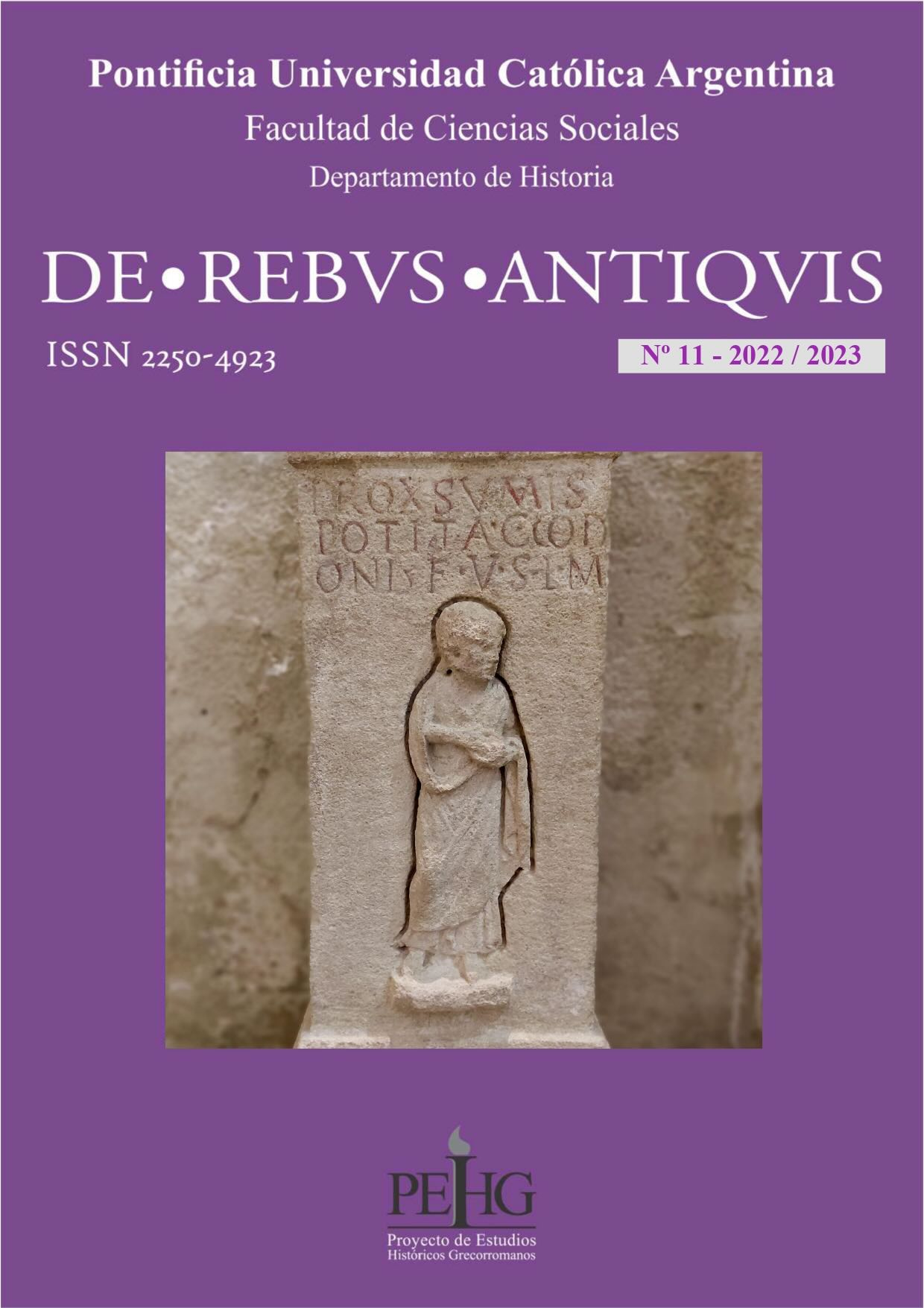Ancient History and the field of reception: an old new Augustus in John Williams' epistolary novel
Keywords:
Ancient History; Reception studies; Augustus; power; knowledge of the pastAbstract
This essay aims to think about and defend the actuality of Ancient History and, especially, the reception studies of Antiquity. To do so, the text describes the constitution of the field within the classics and then analyzes the novel Augustus (1972), by John Williams (1922-1994). This approach of a case of reception by fiction intends to observe how Williams’s novel incorporates both what the ancient sources told us and what they did not tell us about the Rome of Augustus. Antiquity, as Williams uses it, could be thought as code for power and knowledge of the past.Downloads
References
BIBLIOGRAFÍA
FUENTES EDITADAS:
AUGUSTO. (2007). Res Gestae Diui Augusti. A vida e os feitos do divino Augusto. Tradução: MATHEUS Trevizan, Paulo Sérgio Vasconcellos e Antônio Martinez de Rezende. Belo Horizonte: Editora UFMG.
LIVY. (1987). XIV. History of Rome. Summaries, Fragments, and Obsequens. Transl. Alfred C. Schlesinger. Cambridge, Massachusetts: Harvard University Press.
WILLIAMS, J. (2003). Augustus. London: Vintage UK.
REFERENCIAS BIBLIOGRÁFICAS:
DABDAB TRABULSI, J. A. (2011). Le Présent dans le Passé. Autour de quelques Périclès du XX e siècle et de la possibilite d’une vérité en Histoire. Besançon: Presses Universitaires de Franche-Comté.
GALINSKY, K. (1996). Augustan Culture. An interpretative introduction. New Jersey: Princeton University Press.
GIRALDI, W.; SHIELDS, C. J. (2014). On John Williams’s Novel Augustus: A Conversation. Los Angeles Review of Books, November 16 2014, https://lareviewofbooks.org/ article/john-williamss-novel-augustus-conversation/.
GRAY, J. (2014). The thinker’s dictator: Emperor Augustus makes for thrilling fiction. New Statesman, August 29 2014, http://www.newstatesman.com/culture/2014/08/thinker-s-dictatoremperor-augustus-makes-thrilling-fiction.
HARDWICK, L. (2003). Reception Studies. Oxford: Oxford University Press.
MARTINDALE, C. (1993). Redeeming the text: Latin poetry and the hermeneutics of reception. New York: Cambridge University Press.
MARTINDALE, C. - Hardwick, L. (2012). Reception. In: The Oxford Classical Dictionary. Oxford: Oxford University Press.
MCGARHERN, J. (2003) Augustus. London: Vintage UK; vii - xiii.
PERALTA, D. P. (2019). Crises of Democracy at Columbia: Weaponizing the Classics. Disponível em:
https://www.youtube.com/watch?v=vjBs49285wM&t=1401s (Acesso em: 29 de abril, 2021).
PERALTA, D. P. (2020). Darkness Visible: The hounted house of classics. Disponível em: https://www.youtube.com/watch?v=sqbJl71H1t0&t=2921s (Acesso em: 29 de abril, 2021).
PERALTA, D. P. (2021). Why “Why Classics”?. Disponível em: https://classics.stanford.edu/dan-el-padilla-peralta-why-why-classics (Acesso em: 27 de abril, 2021).
RALEIGH, W. (1904). Style. London: Edward Arnold Edition.
SILVA, G. J. (2007). História Antiga e usos do passado: um estudo de apropriações da Antiguidade sob o Regime de Vichy. São Paulo: Annablume.
SILVA, G. J. - FUNARI, P. - GARRAFFONI, R.S. (2020). Recepções da Antiguidade e usos do passado: estabelecimento dos campos e sua presença na realidade brasileira. Revista Brasileira de História. São Paulo, v. 40, n. 84; 34-66.
SYME, R. (1937). Augustus and Agrippa. The Classical Review, n. 5; 194–195.
VIDAL-NAQUET, P. (2002). Os gregos, os historiadores, a democracia. O grande desvio. Tradução de Jônatas Batista Neto. São Paulo: Companhia das Letras.
Published
Versions
- 12/27/2024 (2)
- 12/26/2024 (1)
How to Cite
Issue
Section
License
Copyright (c) 2024 Glaydson José Da Silva, Lorena Lopes Da Costa

This work is licensed under a Creative Commons Attribution-NonCommercial-ShareAlike 4.0 International License.










